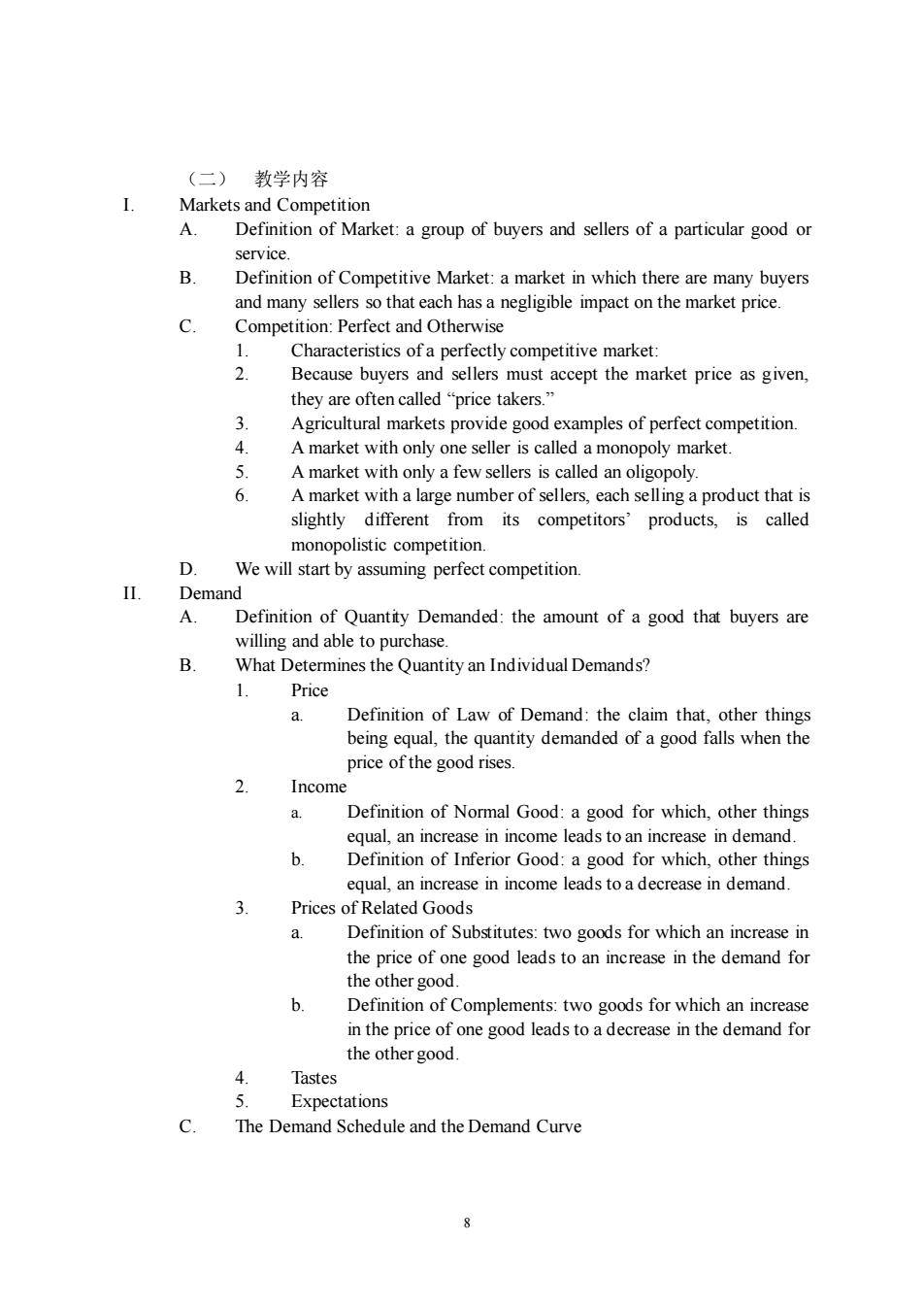正在加载图片...

(二)教学内容 Markets and Competition A. Definition of Market:a group of buyers and sellers of a particular good or service. B Definition of Competitive Market:a market in which there are many buyers and many sellers so that each has a negligible impact on the market price. Com etition:Perfect and Otherwise Charac eristics ofa perfectly competitive market Because buyers and sellers must accept the market price as given. they are often called"price takers." Agricultural markets provide good examples of perfect competition. A market with only one seller is called a poly market A market v re number of sellers.each selling proucth nly a few sellers i 6 ket w slightly different from its competitors'products,is called monopolistic competition. We will start by assuming perfect competition. II. A Definition of Quantity Demanded:the amount of a good that buyers are willing and able to purchase. B. What Determines the Quantity an Individual Demands? Price Definition of Law of Demand:the claim that,other thing being equal,the quantity demanded of a good falls when the price of the good rises. Income Definition of Normal Good:a good for which.other things equal,an increase in inco ase in demand b. Definitio 1ofInfierno ngs equal,an increase in income leads toa decrease in demand Prices of Related Goods a Definition of substitutes:two goods for which an increase in the price of one good leads to an increase in the demand for the othe b Definition of Complements:two goods for which an increase in the price of one good leads to a decrease in the demand for the other good. 4 Tastes Expectations C The Demand Schedule and the Demand Curve 88 (二) 教学内容 I. Markets and Competition A. Definition of Market: a group of buyers and sellers of a particular good or service. B. Definition of Competitive Market: a market in which there are many buyers and many sellers so that each has a negligible impact on the market price. C. Competition: Perfect and Otherwise 1. Characteristics of a perfectly competitive market: 2. Because buyers and sellers must accept the market price as given, they are often called “price takers.” 3. Agricultural markets provide good examples of perfect competition. 4. A market with only one seller is called a monopoly market. 5. A market with only a few sellers is called an oligopoly. 6. A market with a large number of sellers, each selling a product that is slightly different from its competitors’ products, is called monopolistic competition. D. We will start by assuming perfect competition. II. Demand A. Definition of Quantity Demanded: the amount of a good that buyers are willing and able to purchase. B. What Determines the Quantity an Individual Demands? 1. Price a. Definition of Law of Demand: the claim that, other things being equal, the quantity demanded of a good falls when the price of the good rises. 2. Income a. Definition of Normal Good: a good for which, other things equal, an increase in income leads to an increase in demand. b. Definition of Inferior Good: a good for which, other things equal, an increase in income leads to a decrease in demand. 3. Prices of Related Goods a. Definition of Substitutes: two goods for which an increase in the price of one good leads to an increase in the demand for the other good. b. Definition of Complements: two goods for which an increase in the price of one good leads to a decrease in the demand for the other good. 4. Tastes 5. Expectations C. The Demand Schedule and the Demand Curve